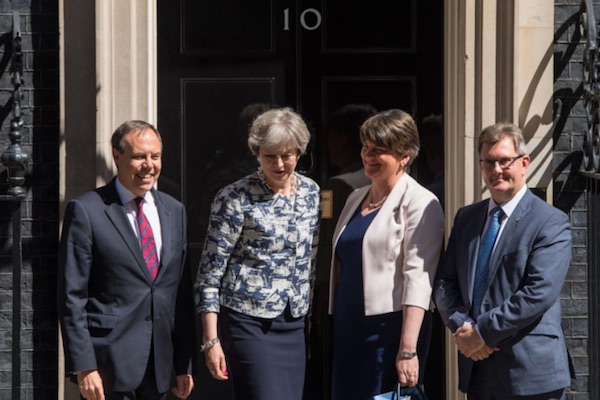
A deal between the Tories and the Democratic Unionist Party could allow the unionist hardliners to control British policy in the north of Ireland for the lifetime of the current Westminster parliament.
The pact has come as a hammer blow to the political process in the North as it clearly breaks the Good Friday Agreement, most obviously because it has ignored the requirement of the London government to be ‘rigorous impartiality’.
The 20-year-old peace deal includes a firm and unequivocal commitment from all participants, including the British government to the ‘just and equal treatment of the identity and ethos’ of both nationalist and loyalist communities.
However, a “co-ordination committee” referred to obliquely in the text of the deal will allow the DUP to exert direct control of British policy in the North, including how a billion pound payoff financial package is spent.
Political commentator Brian Feeney warned that the elements of the deal which had not been made public could be the most devastating for Sinn Fein and nationalism. “What we don’t know is what has been agreed tacitly. Anyone who believes that the written deal is all there is is a naive fool,” he said.
“It will be years before all the grubby little side deals emerge from the co-ordinating committee. That was the case in the desperate days of Callaghan’s government in 1978-9. Publicly the major deal then was giving five extra Westminster seats to the north but behind the Speaker’s chair all sorts of dirty wee local plots were hatched with Ulster Unionists.”
But an explicit Tory commitment to shield British Crown forces from prosecution over conflict-related killings has provoked outrage.
In the document, a provision called “legacy” indicated that a new law would be passed blocking criminal cases against soldiers and RUC/PSNI police for their war crimes during the conflict. The Dublin government has admitted that any such law would breach the 2014 Stormont House Agreement.
Separately, a ‘military covenant’ to guarantee former British military personnel and their families priority access to healthcare and other services in the North of Ireland also violates articles of a number of agreements which deal with equality.
And as if to leave no doubt that the Conservatives have abandoned any sense of impartiality, the Tories also issued a statement to declare their “admiration” of the British Army’s role in the conflict. Campaigners described the language used to praise members of the Crown forces as “odious”.
Relatives for Justice spokesman Mike Ritchie, who works with the loved ones of people killed by the British military, police, and state agents, voiced his concerns about the comments.
“It is very regrettable that these two parties have sought yet again to elevate perpetrators from state forces as somehow worthy of special treatment,” he said.
“They do this both in relation to their desire to impose the so-called Military Covenant on public authorities here and now with their commentary yet again that legacy is focusing disproportionately on state forces.”
Paul O’Connor, director of the Pat Finucane Centre, also expressed concern about the wording of the statement.
“The statement that has been issued demonstrates that the British Government feels that they owe no debt whatsoever to the bereaved due to the actions of the British Army and RUC.”
Sinn Fein stopped short of stating that the Good Friday Agreement had been broken, but the party’s speechless response was widely noted.
In a holding statement issued four hours after the deal was made public, Sinn Fein president Gerry Adams insisted: “Sinn Fein will vigorously pursue the rights of citizens currently being denied by the DUP and the British government.
“We are committed to equality. Sinn Fein will resolutely oppose any attempt to give preferential treatment to British forces, either in terms of legacy or the provision of public services.”
Mr Adams also said the DUP had been given a “blank cheque” on Brexit policy in Ireland. He said that the “allocation of additional funds could help to ease the enormous pressure on our public services” but that the “devil is in the detail”.
He also warned the DUP that it “should be minded of the words of Edward Carson” speaking in 1921 on the Tory machinations that led to the partition of Ireland: ‘What a fool I was. I was only a puppet, and so was Ulster, and so was Ireland, in that political game that was to get the Conservative party into power’.”
![[Irish Republican News]](https://republican-news.org/graphics/title_gifs/rn.gif)
![[Irish Republican News]](https://republican-news.org/graphics/title_gifs/harp.gif)

